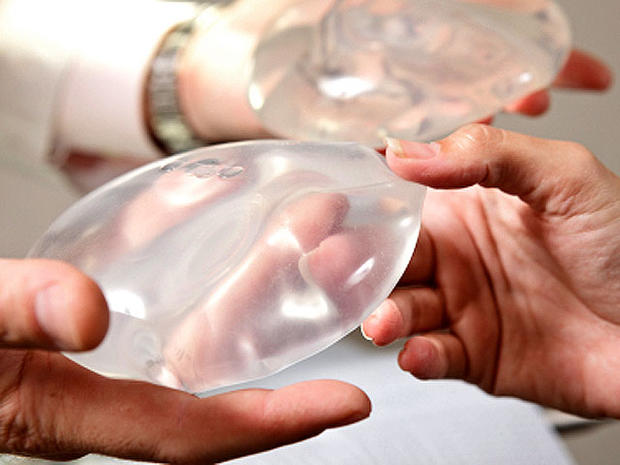Breast implants safe but not problem-free, FDA says
(CBS) Safety concerns drove silicone-gel breast implants from the U.S. market for 14 years. Then, in 2006, the FDA made them available again. Now, in its first major review of follow-up studies, it declares that these implants are safe and effective when they are used as intended.
"Preliminary data does not indicate that silicone-gel filled breast implants cause breast cancer, reproductive problems, or connective tissue disease such as rheumatoid arthritis or lupus," says Dr. Jeffrey Shuren, head of the FDA's Center for Devices and Radiological Health.
But Shuren warns that does not mean women can drop their guard. "Breast implants are not lifetime devices. The longer a woman has silicone-gel breast implants, the more likely she is to experience complications." In fact, data show additional surgeries are common. "As many as one in five women who receive silicone-gel filled implants to increase the size of their breasts will need to have those implants removed within 10 years," Shuren warns. In addition, up to 50 percent of women who get them to reconstruct their breasts following cancer or some other health problem will need to get them replaced.
One of the most frequent complications is called capsular contracture, a hardening of the area around the implant. Other common complications include implant rupture, wrinkling, breast asymmetry, scarring, pain and infection. Shuren says this underlines the need for women with these implants to see their doctors for check-ups. "Pay attention to changes. Women should notify their health care provider if they develop any unusual signs or symptoms."
Dr. Shuren says unfortunately, many women just don't follow-through, raising their risks of developing complications that will require surgery. That's one of the major problems with the company studies that are the basis of the agency's safety review. Dropout rates are high. So patient tracking is often incomplete, critics say.
The studies are being conducted by the two American manufacturers of the products, Allergan, and Mentor, a division of Johnson and Johnson. They receive huge profits from the implant market. Breast augmentations are extremely popular. It's estimated nearly 300,000 women receive either silicone gel or saline implants every year in the U.S. alone. And the FDA says it's reports show most patients express satisfaction with the results. It requires follow-up safety research. And Shuren pledges the agency will continue to evaluate data to ensure silicone-gel breast implants are safe.
The FDA has more information about breast implants.
